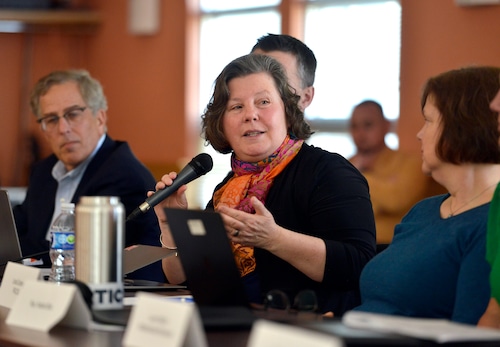Bay State families struggling with their food bills could get some extra help if a western Massachusetts lawmaker has anything to say about it.
The budget plan that majority-Senate Democrats are expected to unveil Tuesday will fully fund the state’s Healthy Incentives Program, which allows qualifying people to buy locally grown fruits and vegetables from participating farmers.
The language, backed by Sen. Joanne M. Comerford, D-Hampshire, Franklin, and Worcester, would provide some $25 million in funding for the new fiscal year that starts July 1, up from the current $15 million.
“It really speaks to this critical moment,” Comerford, of Northampton, said of shifting federal winds that affected social services programs across government.
The “HIP” program, as it’s known in legislative shorthand, traces its roots to 2017. It is intended as an adjunct to the federal government’s Supplemental Nutrition Assistance Program (SNAP), sometimes referred to as “food stamps.”
With that federal program potentially on the chopping block on Capitol Hill, Comerford and her allies exclusively told MassLive that the expanded state support is even more critical.

State Sen. Joanne Comerford, D-Hampshire/Franklin/Worcester, is backing language to fully fund the state’s Healthy Incentives Program. (Don Treeger/The Republican)
“It is urgent and timely and necessary,” Comerford, the vice chairperson of the budget-writing Senate Ways and Means Committee, said.
If it’s finally approved, the additional money would also restore the maximum benefit under the program to $80 a month for a family of six or more. Right now, that benefit is flat-funded at $20, irrespective of the size of the household.
The state was forced to trim support for the program after huge demand, which meant that an initial round of funding that was supposed to last three years was exhausted in 10 months, Rebecca Miller, the policy director for the Massachusetts Food System Collaborative, said.
The advocacy group has been pressing the case for full funding for months, arguing that it provides a critical lifeline to hungry families and the farms that serve them.
“It’s been devastating for farmers,” she said. “A lot of farmers grew products to serve folks [in the program],” she said. “Anecdotally, we’ve heard about people going to food pantries and having less options. Seniors have had to rely on other sources for food.”
At the same time, “we’ve seen a lot of chaos from the federal government,” as it’s cut other programs that support access to fresh fruits and vegetables, including one that allowed schools to buy farm-fresh foods.
That, too, rolled downhill on farmers.
“A lot of folks are scrambling, trying to figure out what they are going to do,” she said.
If the new Senate language is approved, the infusion of additional taxpayer cash means families can buy “tomatoes, lettuce, carrots, apples, strawberries and blueberries,” from local growers to augment the food they purchase through SNAP, Comerford said.
And that also matters because every county in Massachusetts experienced some degree of food insecurity in 2023, according to the Greater Boston Food Bank. All told, that came out to 1.9 million adults, or 34% of the state’s total population.
In Bristol, Hampden and Suffolk counties, 45% of adults reported food insecurity in 2023, data show.
The number is even higher among families with children, with 1 in 3 households with children statewide reporting food insecurity in 2023, the same data shows.
The issue is particularly pressing in western Massachusetts, where the prevalence of child-level food insecurity hit 43% in 2023, data show.
As a practical matter, that means a child went hungry, skipped a meal, or didn’t eat for an entire day because there wasn’t enough money for food.
It also comes as families in Massachusetts and nationwide continue to contend with high prices on supermarket shelves, while the Trump administration says it’s working to bring them down.
“Food insecurity is real. It’s happening to people all over the state,” Nicole McKinstry, of McKinstry Farms, which participates in the program, told MassLive.
McKinstry told MassLive that she’s seen families with children come into her shop on Montgomery Street and heard them turn down their kids’ pleas for strawberries and raspberries because they need to buy such longer-lasting produce as potatoes.

Will McKinstry, head grower at McKinstry Farms in Chicopee, is in the corn field early in the morning on July 1, 2022. (Hoang ‘Leon’ Nguyen/The Republican)
“It‘s hard for them to understand why they can’t get those fresh fruits and vegetables,” she said.
McKinstry said she’s had to make financial adjustments, trimming staff to account for that reduced state funding. The program also helps her through the leaner winter months when there’s not as much fresh produce at hand.
While the Senate plan that’s expected to be unveiled on Tuesday is one voice in the annual budget derby, it is far from the final one.
Democratic Gov. Maura Healey included $18.8 million for the program in the $62 billion spending bill she filed earlier this year. The $61.4 billion budget proposal approved by the majority-Democrat state House last week sets aside $20 million for the program.
That means the final amount, like nearly everything else surrounding the state’s final budget, will have to be ironed out in closed-door talks that could stretch well into early summer.
Comerford, the veteran of more than a few budget battles, is hoping for the best.
“It has been a win-win kind of program,” she said.
